- The 11 Best Landing Page Builder Software Tools [2024] - April 16, 2024
- 17+ Best AI Writing Software Tools [2024] - February 15, 2024
- How to Grow Your Ecommerce Business Exponentially: 11 Growth Hacks - January 6, 2024
What would you say if I told you that you can make money while you sleep?
Seriously. We’re doing it with affiliate marketing.
When Hailey and I started Growth Marketing Pro in early 2017, we never planned on making money from blogging.
We started writing for fun.

But pretty quickly, people wanted to pay us for our time.
So we started monetizing the blog in two ways:
- Our audience wanted to speak with us. So we started charging for our time.
- And with affiliate marketing. When users clicked on our software recommendations, we began making money from their purchases.
Affiliate marketing revenue became super interesting to me and Hailey.
We started by selling our favorite webinar tool at the time, EverWebinar.
We already had a bunch of articles about the product anyway — so we just added a few buttons with our $1 14-day trial affiliate link.


Lo and behold, readers clicked and bought the product!
At first we couldn’t believe it. But the more we saw, the more affiliate income became completely irresistible to us…
Why?
Affiliate income is passive income.
Passive income = income that takes no work to generate… 24 hours a day, 7 days a week.
We began to imagine a world where we could share our honest opinions in blog posts, and get paid for doing so!
That’s the dream, right?
By the way, I turned this post into a video in case you’re YouTube-minded.
Table of Contents
Making money with affiliate marketing
Affiliate marketing is awesome because you don’t need a product to sell. You can sell someone else’s.
For Growth Marketing Pro, affiliate marketing is lucrative and like I said, very passive.
If Hailey and I stopped working on the blog tomorrow and moved to Mexico, we would still make make money!

Maybe you’ve tried affiliate marketing before without much success.
I’ve spoken with hundreds of entrepreneurs who have tried and failed.
That’s not surprising. Hailey and I fumbled around in the beginning too, but now we’ve distilled it all down to a pretty easy formula… a formula that makes us $10s of thousands in affiliate sales every month.
Follow my tips and you can replicate our successes. I promise.
The proof
By late 2017, we were beginning to really understand affiliate marketing — at that point, we were making a few thousand dollars every month by selling webinar tools and referral software.
It was then, I decided to start writing about my favorite marketing tool on earth: a landing page software tool called Unbounce.
Slowly but surely, pageviews on our Unbounce blog posts began to climb.
Google began to see me as an expert on landing page software and soon enough Growth Marketing Pro ranked on page 1 for nearly every landing page software search keyword.
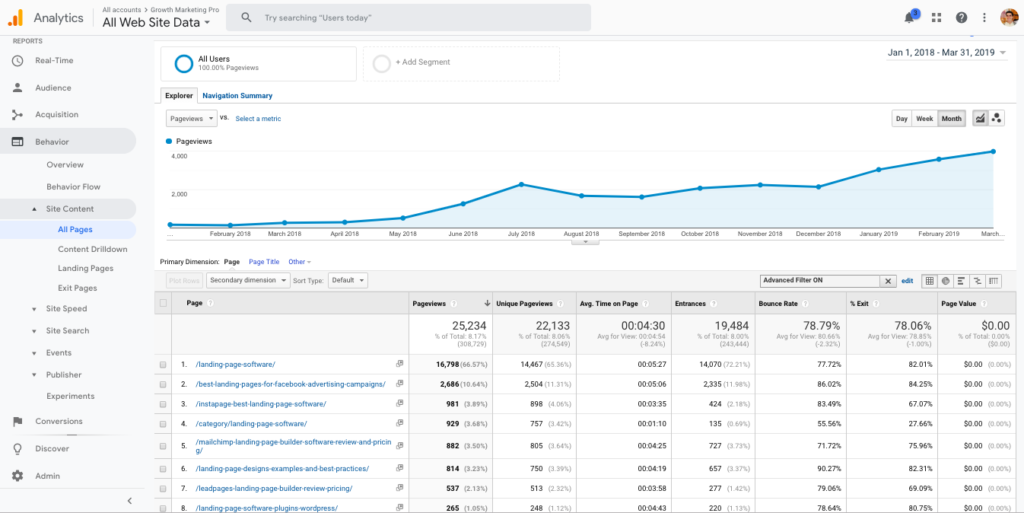
My honest, unbiased reviews and musings were enough to convince Google and our readership of my deep understanding of the topic.
Lo and behold, people began to purchase Unbounce through my Unbounce affiliate link on articles I wrote.
For every user who purchased the Unbounce product, we made 30% of the sale.
And guess what: last month we made $7,554 from Unbounce affiliate sales alone! Multiply that by 12 months = $90,648. Yup, we should minimally make $90k this year from Unbounce — passively!
And Unbounce is just one of our five biggest affiliate partners.
“Okay cool Mark,” you’re probably saying to yourself. “Enough bragging. How does this help me?”
Don’t worry, I’ll shut up in a minute and tell you how to recreate our successes. But first, I have to answer one question.
“Mark, why are you telling me any of this?”
You would think Hailey and I would want to keep this information to ourselves. Won’t more competition hurt our business?
Not really.
Why?
- Our audience trusts us. Hailey and I engage with our audience every day. We answer emails, reply to comments — heck, some of our audience are GMP Agency clients. If your audience trusts you, all the competition in the world won’t take your sales away.
- We’re experts on the topics we write about. Hailey and I wouldn’t be able to sell pet toys, books, TVs, health products, nutrition products, juicers, SAT prep courses or almost anything… but marketing software. On the topic of marketing software, we’re experts. Seriously. We do this stuff all day, every day. That means we win Google searches and prove the value of our affiliates better than anyone else on the internet.
The point is this: if you have niche expertise and don’t betray the trust of your audience, you can sell a product or service online… without having to worry about anyone else taking your lunch.
The 5 ways to succeed at generating affiliate income
Like I said, in late 2017 we really started to figure this stuff out. And just 18 months later, I bought my first apartment — all with blogging income!
Generating affiliate income isn’t that complicated. And it doesn’t even take that long to start generating a few thousand dollars a month.
Hailey and I only write three days a week for a couple hours each day.

I promise if you’re an expert at something… anything… you can create an audience and sell a product on the web.
So, if you’re bold and you want to succeed, follow the steps I lay out below.
(Inspired and want to start a blog? Read here)
1. Trust and personality breed affiliate sales
What do Hailey’s and my dating life or our quirky friendship have to do with affiliate sales? Nothing.
But what does that stuff have to do with our brand?
Everything!
In the words of a blogger peer, Pat Flynn: “People connect with people, and the more you can become a person in the eyes of your audience, the easier it is for them to connect with you—it’s as simple as that.”
The first step in selling anything on the internet is trust.
People know Hailey and I as real people. They may know that we met via Skype years ago when she lived in New York and that she moved here to work for me at a startup. They may know that I love basketball but play like I couldn’t make the JV team.
Share the good, bad and the ugly. Be honest in your reviews. No person, tool or product is perfect and if you say it is perfect, your audience definitely won’t trust you.
That’s why Hailey and I share personal anecdotes and give all the information we can about everything we sell. And we never sell anything we don’t know and love. If we betray our audience’s trust, we’ll put ourselves out of business.
Tell stories!
Stories help illustrate why a product is important. They put things in context and make your pitch more relatable. Plus, they continue to build trust with your audience. Even more, your search engine optimization (SEO) will benefit. Google likes to rank content that keeps users on page longer. And stories do just that.
Give away secrets!
You may have a secret sauce that you don’t want to share.
Share it!
There’s so much noise on the internet. If you can give your audience something really useful — thought leadership — you’ll be rewarded in sales and Google ranking.
Build trust. Be rewarded.
2. What should you sell? Start with the pain, not the product
So now you know where in the customer journey to sell, but what should you sell?
Once you’ve started to build your audience and develop a relationship with them, you’ll start to learn what that audience needs. The next step is to identify products you can recommend to meet your audience’s needs and help them in their journey.
First, keep in mind that sometimes the products will be ones that allow you to generate an affiliate income and some won’t. You never want to start with a product or commission in mind. You want to start with the problem, then find solutions for it.
This is about trust, not sales! I promise sales will follow if you give your audience the best information possible.
To understand what the visitor to your site needs, think about their frame of mind. Use Google Analytics to understand what the most trafficked pages on your site are. Then think about what the user on that page is ultimately trying to achieve.
How?
- Consider what the audience is searching for to land on that page.
- Use a tool like Crazy Egg to see what parts of the webpage your audience is spending the most time on.
- Survey them! So many people skip over this step. Send a SurveyMonkey survey to your email list and just ask them what they’re coming to you for and what tools could help them reach their goals.
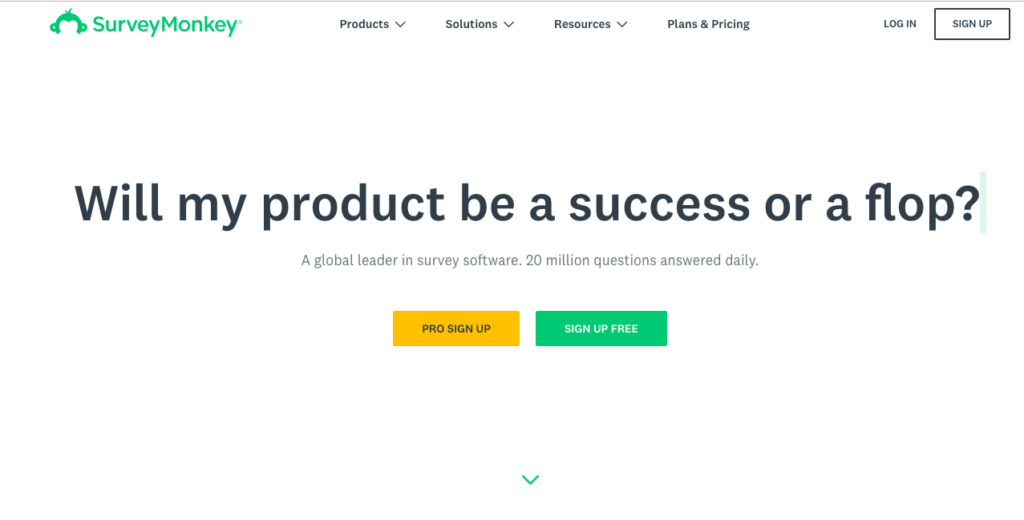
You need your recommendations to be precise and targeted, so your audience can 1) get the information they need and 2) reach their goals.
Once you’ve identified what you want to help your new visitor achieve, think about how they’re going to get there. What’s their roadmap or path to success? Defining the steps on this path will help you determine exactly what kinds of products will help your audience at different points along the path.
What can you sell?
Almost anything.
Software, courses, advanced webinars, stuff on Amazon, electronics and almost anything else. Start your search for products to sell here.
3. Play the long game
How should you sell?
It’s all about intent.
Simply put, someone is more likely to purchase Unbounce via our affiliate link on an article titled “Instapage vs Unbounce” than they are on an article titled, “How to Run Facebook Ads.”
Naturally, the purchase intent of the user on the “Instapage vs Unbounce” article is much higher than on an article more generally about Facebook advertising.
Therefore, your pitch needs to be different. For the user reading about Facebook ads, my goal is always to engage the user and introduce them to the concept of landing page software — which will help them run Facebook ads in a more cost effective way.
The pitch matches the intent.
I don’t try and sell readers Unbounce right then and there. Instead, I funnel them to a page about landing page software or simply collect an email address. Your goal should be to build trust and genuinely engage.
Readers can smell inappropriate and unnecessarily forceful sells from a mile away.
Relationships take time to build.
The goal is to lead your audience to the right conclusion, not force it down their throat. Instead of “buy Unbounce now,” try and introduce them to concepts that will change their thinking. You need to “soft pitch” them.
“Want to run Facebook ads more intelligently?”
“Great, you should learn about landing page software and what it can do for you.”
Easy, right?
4. Be an expert and beat Google
I’ve been using landing page software since 2012. I’ve spent thousands of hours doing the following:
- Building landing pages
- Running marketing campaigns to those pages
- Testing all the different tools: Instapage, Unbounce, Leadpages and Clickfunnels
- Interviewing the CEOs of landing page software companies
- Optimizing landing pages
- And basically exploring every facet of landing page software… not with the idea of selling it eventually… just because I needed it to growth hack for companies I worked for in San Francisco.
That makes me a real expert.
And in the world of affiliate marketing, expertise does two things:
- Builds trust. Yup, again it comes back to trust! I have a unique and authoritative perspective on how best to use landing page software, which helps my readership trust me.
- Builds your organic traffic. Google ranks authoritative stuff. If you’re just regurgitating what everyone else on the internet is saying about a topic, the sources you’re taking from will rank above you. Google ranks thought leadership.
The best way to build free, truly passive income is via SEO — Google search traffic. The best affiliate marketers earn a good deal of their income via SEO.
The good news is that the same great content you use to build trust with your audience should boost your Google search rankings.
Remember: being an expert doesn’t mean making things up, being too grandiose or deceiving your audience. Showing your expertise can be as simple as:
- Giving first-hand accounts of your experience with the product you’re selling in the form of data or stories
- Interviews with users or creators of the products
- First person reviews via video or audio
- Taking slightly controversial stances on the topic
Doing some of the above will build trust and help you rank on Google, guaranteed.
Also read: The Secrets of Affiliate SEO
5. Write about the right stuff
Hailey and I write about everything. Usually, we write about growth hacks and about our experiences with tools we use every day.
We both just love writing.
But if you’re writing to give yourself the highest odds of making affiliate sales, you need be a little more thoughtful.
How?
The goal should be to rank as high as possible for keywords the “furthest down the funnel” — concepts that are very likely to yield purchasers.
I’m reminded of this fact every month. Quick story:
I actually started another blog — a healthcare blog called ManlyWellness. One of the keywords I rank for is “how to increase your penis size”… Try not to judge me.
I get 80,692 organic searchers to that page per month! And in a normal month, I make less than $200 in affiliate sales from it. That’s really, really bad.
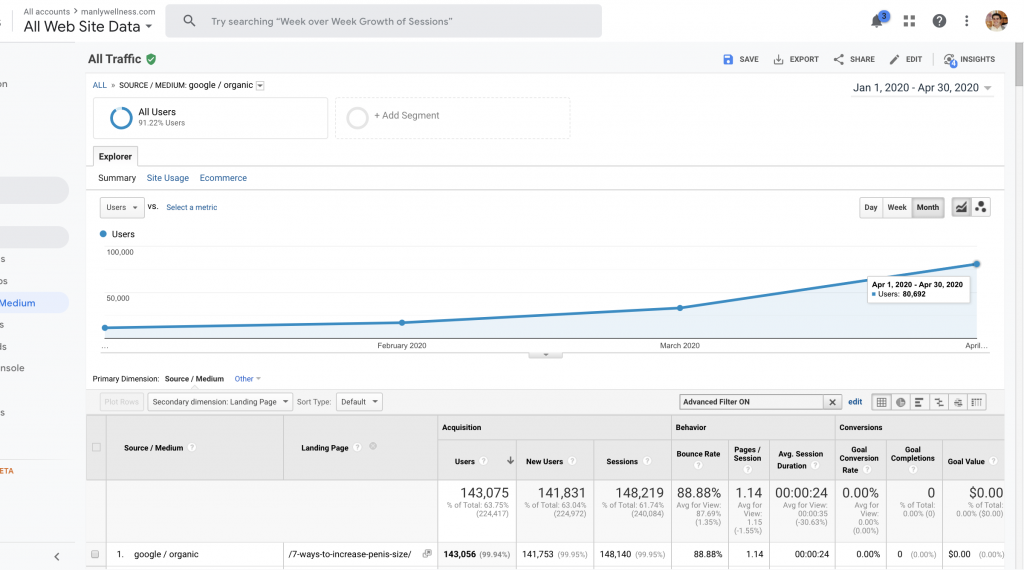
So while that page gets tons of traffic and funnels people to other parts of the site, there isn’t nearly enough intent in that search query to sell a product on it. My audience is probably a bunch of 13 year old boys on their parent’s iPad.
Keep intent in mind when you’re choosing topics to write about… especially if you’re just getting started.
Conclusion
Affiliate marketing takes time and commitment. That’s the first thing you need to understand.
If it was easy to do, everyone would try to make passive income on the internet.
It’s going to take time — months, even years. But if building an audience on the internet and making passive income is a goal of yours, I promise, it’s worth the effort.
Plus, if you’re writing about what you’re passionate about, it won’t even feel like work!
If you want to run an idea by me, email me and I’ll respond within a day or two. Trust me.
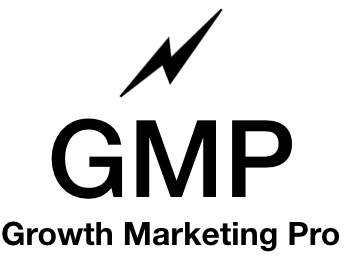


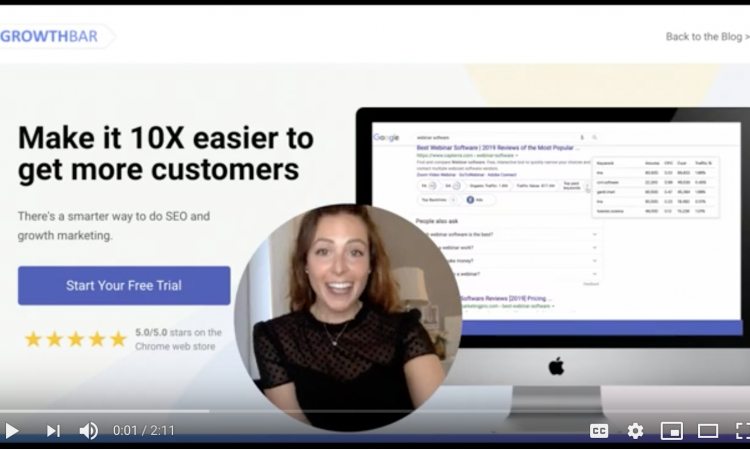
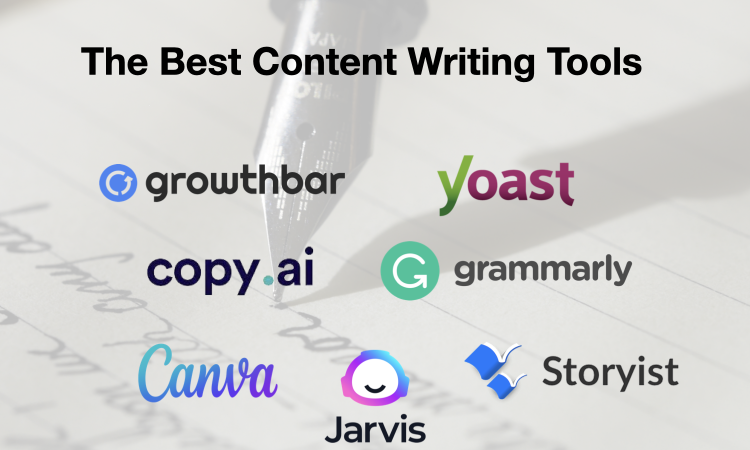
Nice post. Please, is it compulsory I have a personal website before starting affiliate marketing and what are the risk involve?. Thanks
Hi Bello
You don’t technically need a website to begin. Some Instagram influencers are affiliate marketers. Like us, they just use their affiliate link and followers click through and buy!
Good luck
I’m saving this post as one of my favorites. You writting skills are really good ! But wait, How do you contact oficially a company and ask to be affiliates ??
All you have to do is reach out and ask. Google “xyz company affiliate” and you may find their affiliate program webpage (if they have one). If they don’t, reach out to the contact info listed on the website, or find a marketer @ the company on LinkedIn.
Amazing how can we transform our lives with these top ideas. i got a question in m mind if you could help please.
How helpful will it be for small business owners to work on affiliate program? How much time would it take to build an authority affiliate program?
Thanks
Jawad: I think affiliate programs are useful for nearly every size business. They’re basically just partnerships. Partnerships are great at any stage and particularly for small businesses, because they are quick to create.
I am really interested in affiliate marketing. How about physical products like gadgets, accessories, etc.? I heard that Amazon have an affiliate program. Do you think, I can also apply the same methods on it as what you’re promoting are digital products?
Great question, Effren. It works almost the exact same! Amazon’s marketplace gives you a link and you sell the product in the same way. (Hailey and I actually do sell a few Amazon books on Growth Marketing Pro)
what advice would you like to give to beginners and how long will it take me to be where you are right now? I have a full time job and i am thinking about starting my setup. I am think about resigning, but thats just a thought for now. If i dont make it there, this can backfire. How should i proceed?
Jason, the great thing about building an affiliate business through organic traffic is that it’s passive. You can work a few hours a day in the evening and get your “thing” off the ground in your free time. Plan for 6-12 months of work to get it fully off the ground and you’ll be ready to quit 🙂
This was a very good piece and quite informative. Could you also talk about how one can contact companies in order to become an affiliate? Thanks Mark.
Thanks Matabel. Google “xyz company affiliate” and you may find their affiliate program webpage (if they have one). If they don’t, reach out to the contact info listed on the website, or find a marketer @ the company on LinkedIn. Good luck!
I can’t wait to be an affiliate marketer, Thanks very much Mark for presenting this wonderful opportunity to us
cheers
Douglas
Hi, Mark
Congratulation!! for achieving that milestone.
Whenever I saw content like this, I get motivated.
I think affiliate marketing is one of the best methods to make money online.
I will take your advice and will use it in my affiliate strategy.
Thank you so much!!
??
Hello Mark and Hailey, you both are my inspirations I really value your advice and recommendations. I just want to ask one question can we use a small personal blog for affiliate marketing?
As long as your blog has some sort of niche and well-written, insightful content you can succeed!
Another great post. When starting out with affiliate marketing, what are some of the best ways to drive initial traffic?
To kickstart traffic, write about newsworthy topics, make sure to send your friends to the site to engage/share and write often!
Check out this post for more: https://www.growthmarketingpro.com/best-digital-marketing-launch-strategy/
Building trust seems to be a valuable foundation in all businesses (or so it is claimed). However, it’s clear that little personal touches you add to GMP serve as a sort of bridge which crosses the threshold from technical jargon to personal discourse and literally shows us on your bottom line—a double, maybe triple, win. An interesting and worthwhile read. Keep it up!
Haha love it! Thanks Drew. We try and give the good, bad and the ugly — being “human” really works on the internet today.
How long did it take for you and Hailey to become experts in growth marketing? What were some of your early mistakes (if you may share them)? Thanks!
Yes Mark, thanks for sharing your successful experience with us. It has given me confidence that consistency can work & will definitely worth the effort I have put in it. Now, will keep on investing my time and passion in my business of writing. Thank You.
Love hearing that!
Hey Mark,
Out of curiosity, how long were you writing about landing pages before you started seeing better rankings in Google.
Was there an inflection point you noticed or was it a slow and steady kind of thing?
Also, did you build tons of links to key landing page articles or did they show up naturally AFTErR you started ranking?
Hey Daniel
It was definitely slow and steady. Some niches pop, while others take months and months. It’s hard to say without trying. For landing page software, I think it probably took 2 months before I started getting 20+ visitors/day to my posts.
95% of the links are natural, just by writing strong content.
Thanks!
Thanks for the detailed post and sharing your insights. Is there any particular category of software reviews you would be focusing on?
As somebody looking to dabble in affiliate marketing in order to increase my passive income I find this piece to be extremely inisghtful, thanks for sharing.
very inspiring and very informative. thanks a lot for sharing such a valuable article. Keep posting!